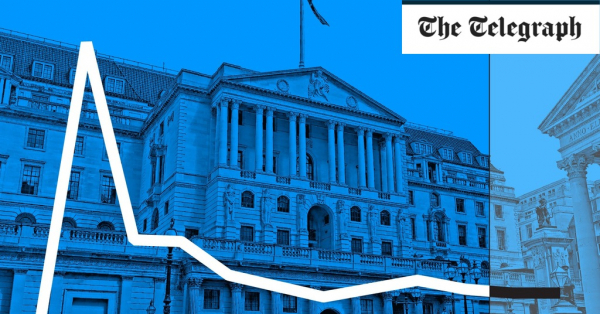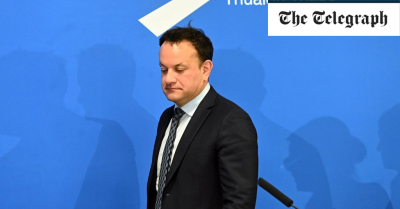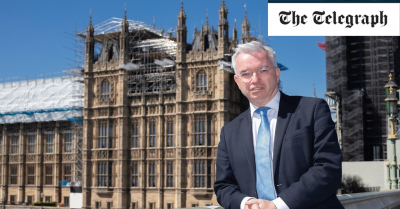Challenges Ahead: The Bank of England's Role in Britain's Economic Prospects

Warning Bells: Banks Sound Alarms Over Bank of England's Economic Judgment
The confidence of global banking giants in the Bank of England's economic foresight is waning, with concerns mounting over its perceived tightening of monetary policy. Citigroup, among others, warns of an impending economic downturn akin to a depression unless corrective measures are taken. Projections of stagnant growth, coupled with declines in GDP per capita, paint a grim picture stretching over several years, surpassing historical economic crises.
Criticism is directed towards the Bank's reluctance to acknowledge potential flaws in its models, delaying necessary adjustments. Goldman Sachs highlights discrepancies in inflation estimates, suggesting a delayed response from the Monetary Policy Committee (MPC) could exacerbate the situation, leading to emergency rate cuts and the looming threat of recession.
Further voices, including Barclays and the Treasury Select Committee, advocate for immediate rate cuts to address deepening output gaps and subdued inflation. Even the Bank's former chief economist, Andy Haldane, cautions against over-tightening, emphasizing the potential repercussions if his warnings prove accurate.
As pressure mounts and economic indicators signal trouble ahead, the stakes are high for the Bank of England to navigate these challenges effectively, with the specter of accountability looming should their policies falter.
Balancing Act: The Bank of England's Dilemma Amid Economic Uncertainty
Recent data reveals concerning trends in the UK's core inflation, which has fallen to a mere 1.9% annualized over the past six months, trailing behind both the US and the eurozone. Projections suggest that the one-year headline rate could plummet to levels even below Japan's, raising cautionary flags about the potential consequences of such a decline. Nominal GDP contraction in the fourth quarter of the previous year compounds worries, particularly regarding debt dynamics and the debt-to-GDP ratio, reminiscent of challenges faced by Southern Europe during the eurozone's Lost Decade.
Despite these alarming indicators, the Monetary Policy Committee (MPC) maintains its stance, with rates held steady at 5.25%. While some members advocate for rate hikes, concerns linger over persistently sluggish wage growth and its implications for inflation dynamics. Critics argue that focusing on wage growth overlooks broader demand destruction in the labor market, warning of the looming specter of recession if the MPC fails to act promptly.
Furthermore, deteriorating gross operating surplus figures for UK corporations underscore growing economic fragility, potentially paving the way for widespread layoffs and further dampening wage growth. As voices caution against delayed action and the risk of deflationary pressures, contrasting views emerge regarding the potential for a recovery, fueled by global economic rebounds and inflation resurgence.
However, dissenting opinions within the MPC, such as Swati Dhingra's, emphasize the risks of overtightening and the long-term impacts on supply capacity, advocating for a cautious approach to policy decisions. With monetary policy operating on a lag and past tightening yet to fully materialize, the road ahead remains fraught with uncertainty, demanding careful navigation to mitigate the risks of prolonged economic stagnation.
Challenging Conventions: Rethinking Britain's Economic Paradigm
Amidst discussions about the resurgence of global inflation, a closer examination of the underlying factors reveals a stagnant global money supply and mounting concerns over Chinese export practices. Critics argue that fears of a 1970s-style wage-price spiral are unfounded, attributing recent price and wage jumps to isolated occurrences rather than systemic issues.
However, the responsibility for Britain's economic woes over the past decades cannot be solely laid at the feet of the Bank of England. The nation's political establishment, influenced by a fiscal framework modeled after the constraints of a currency union, has stifled productive investment and innovation. Both major parties have adhered to this restrictive fiscal policy, constraining economic growth and stifling creativity, leading to a democratic crisis.
To break free from this cycle, a fundamental shift in economic strategy is imperative. Raising investment levels to match those of successful OECD nations and fostering a clear national economic vision are essential steps towards revitalizing the economy. Whether through a low-tax model inspired by Singapore or a robust industrial policy, decisive action is needed to chart a new course and escape the current economic stagnation.
Maintaining the status quo is untenable, and it is time for bold and visionary leadership to navigate Britain out of its economic quagmire and towards a brighter future.
In conclusion, the narrative surrounding Britain's economic trajectory underscores the need for bold and innovative policymaking to break free from the constraints of outdated fiscal frameworks. While concerns about global inflation persist, it is evident that the roots of Britain's economic challenges run deeper, rooted in a political culture that has prioritized fiscal orthodoxy over meaningful investment and growth.
To chart a new path forward, a reevaluation of economic principles is imperative, accompanied by a clear national vision that prioritizes productive investment and innovation. Whether through a reimagined low-tax model or a robust industrial policy, decisive action is needed to stimulate economic growth and escape the current cycle of stagnation.
The status quo is no longer sustainable, and it is incumbent upon political leaders to embrace change and usher in a new era of economic prosperity for Britain. Only through visionary leadership and decisive policymaking can the nation overcome its current challenges and forge a path towards a brighter and more sustainable future.






